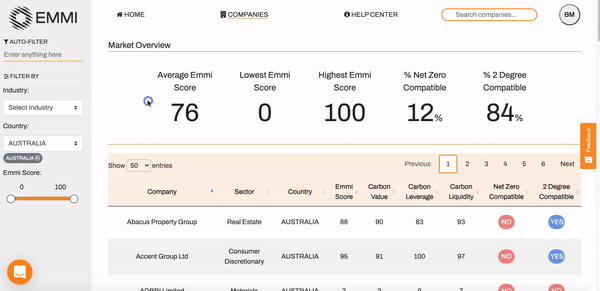Hello everyone,
Welcome to the first edition of the Emmi newsletter! My name is Ben McNeil, part of the founding team at Emmi.
The goal of this newsletter is to help you navigate the world of carbon risk to make better investment decisions. Why is carbon risk important? As Larry Fink, CEO of Blackrock shared in his 2020 letter to clients, “there is a fundamental reshaping of finance” taking place where “climate risk is investment risk”.
What is climate risk versus carbon risk?
It’s important to understand that ‘carbon risk’ is not the same as ‘climate risk’, so let me explain. ‘Climate risk’ often combines two different risks: physical climate risk and carbon transition risk. Here’s a schematic to help.
Physical Climate Risk
Physical climate risk relates to physical asset damage associated with climate warming - things like the frequency and severity of extreme weather events, heat waves, storm surges with sea-level rise, droughts, floods, fires, etc. Aside from temperature, heatwaves, and sea level, however, the science of predicting shifting climate patterns and extreme weather events is very uncertain, particularly at the small-scale asset level.
Physical climate damages (eg sea-level rise) also occur on long timescales(50-100yrs). That is good news since even the most climate-exposed companies (say coastal infrastructure or agriculture) can adapt and absorb much of the risk over that time frame by investing in risk abatement. For example, investing in storm barriers, seawalls, or flood mitigation technologies will all help climate-exposed companies absorb and survive the worst parts of physical climate risk.
Carbon Transition Risk (‘carbon risk’ for short)
The other type of climate risk is called ‘carbon transition risk’ - which refers to the business impact caused by the transition from a high-carbon economy to a low-carbon economy needed to address climate change.
Each year about 36 billion tonnes of carbon dioxide are emitted from global industry. The Paris Climate Agreement—ratified by over 190 countries—aims to ensure that the increase in average temperatures above pre-industrial levels is kept to ‘well below’ 2°C by 2100. To achieve that, science suggests carbon emissions must go to near zero by mid-century. Most countries (even China) have now committed to achieving net-zero carbon emissions by 2050-60.
This global transition from a high-carbon to a low-carbon economy is enormous and this carbon risk has a much broader impact than physical climate risk since all companies have exposure to energy and transportation for example. A recent major UN-backed climate finance analysis suggested that carbon transition risk could impact “as much as 13.2% of overall portfolio value which would represent a value loss of USD10.7 trillion”.
Carbon risk will also occur on a much shorter time scale than the physical climate risk. Why? Because the legal, regulatory, market, or reputational risks are driven by policy and market behavior which can be imposed very quickly. Glaciers melt slowly, but humans act quickly. As the global response to COVID-19 showed, market demand and governments can effectively shut down entire economies to reduce risk. The next decade is where most of the carbon risk will be played out - since that is when peak carbon emissions are likely to occur and financial markets demand lower carbon reliance.
What is Emmi? and why did we build it?
If a business is heavily reliant on producing carbon emissions, then in a world moving to net-zero emissions, it has a high carbon financial risk. But how can we score that risk for any company? Each company has wildly different carbon exposures.
Currently, there is no easy way to assess and track carbon transition risk in a standardized way. Emmi solves that problem for investors and companies.
Emmi was built to make it easy to assess and track carbon financial risk for any company without needing a Ph.D. in climate science or finance. Using Emmi, institutional investors & corporates can understand the financial impact of carbon across any portfolio or company. This will allow them to avoid stranded asset risk and financial loss by using Emmi to understand, anticipate and accelerate the market changes required for a net-zero economy.
Who am I? From climate science to climate finance
My name is Ben McNeil and was a climate scientist for over 20 years. My academic expertise was in building predictive data-driven models to understand carbon dioxide flows around the world. While in academia I became frustrated with the politics of climate change, so in 2009 I wrote a book called ‘The Clean Industrial Revolution’ which argued the economic case for reducing carbon emissions.
I was fortunate to get positive reviews from a number of people including leading economist Ross Garnaut and Nobel Prize winner Professor Peter Doherty. The core thesis I argued was that those who adapted to the emerging low carbon opportunities would be the ones to prosper. On the flip-side, backing carbon-intensive industries didn’t make financial sense in a world moving to low carbon.
Over the past decade, much of these low-carbon trends have accelerated. Gas and renewables have grown to replace coal across the developed world. Electrification of transport on the back of companies like Tesla is surging. In sectors like energy, it’s pretty obvious to observe the shift away from carbon-intensive fuels like coal and oil. But beyond just energy, what about at the company level across ALL sectors? It’s much harder to assess their carbon exposure in a standardized way. You need to combine both climate science and finance to make sense of the exposure - which isn’t easy or available until Emmi.
Although allowing markets to better understand carbon financial risk was critical, I didn't have a finance background. That’s where I was introduced to Michael Lebbon in 2019, the founder of Emmi. With deep financial expertise in carbon finance, Michael had already made good progress towards building out the Emmi platform. I was excited to join and as part of the founding Emmi team.
Over the past 18months, we’ve been busy building out the core Emmi risk algorithm and platform and we’ve also just finished being part of the Startmate accelerator cohort.
Has it launched yet?
Yes! We’ve soft-launched the Emmi platform to our foundation clients and we are in the process of opening it up to those interested. If you would like to book a free demo, you can simply hit reply from your email or you can contact us here.
What to expect from the newsletter?
The Emmi platform covers 2800+ companies across the globe. From Apple to Xero and everything in between, there is a lot to navigate and understand in carbon finance. My goal for these newsletter posts is to share our own learnings/insights in carbon risk whether from the company level, across countries or sectors or even across fund managers.
Welcome and if you have any questions, by all means, let me know!
Ben McNeil








What's been missing from the carbon reduction discussions - the ability for companies, boards, institutional investors to score and track the financial risk of carbon transition consistently across industries and across the globe...